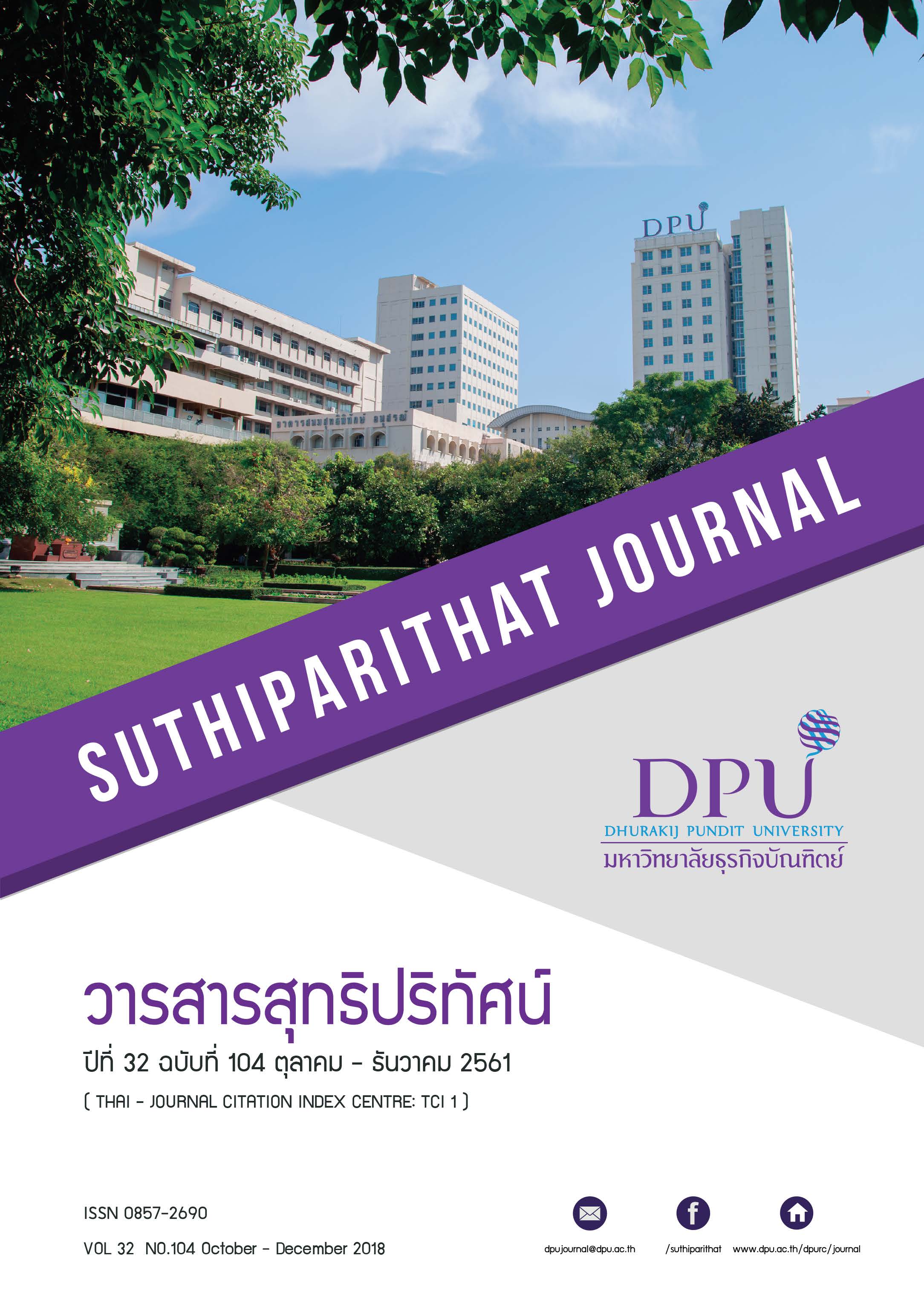การแบ่งปันความรู้ของพนักงานการไฟฟ้าส่วนภูมิภาค: การวิเคราะห์พหุระดับ
คำสำคัญ:
การแบ่งปันความรู้, การวิเคราะห์พหุระดับบทคัดย่อ
การแบ่งปันความรู้มีบทบาทสำคัญอย่างยิ่งสำหรับองค์การ ช่วยให้องค์การเติบโต มีนวัตกรรมเกิดขึ้น ช่วยพัฒนาบุคลากร รวมไปถึงป้องกันความรู้สูญหายไปจากองค์การ การวิจัยครั้งนี้มีวัตถุประสงค์ เพื่อวิเคราะห์ปัจจัยพหุระดับที่ส่งผลต่อการแบ่งปันความรู้ของพนักงานการไฟฟ้าส่วนภูมิภาค (กฟภ.) ไปยังคลังความรู้ขององค์การ โดยใช้เทคนิคการวิเคราะห์พหุระดับ ตัวอย่างที่ใช้ในการทำวิจัยครั้งนี้ คือ พนักงาน 912 คน จาก 60 สำนักงาน ผลการวิเคราะห์ปัจจัยพหุระดับที่ส่งผลต่อการแบ่งปันความรู้ของ พนักงาน กฟภ. ไปยังคลังความรู้ขององค์การ พบว่า ตัวแปรระดับบุคคล ได้แก่ ภาพลักษณ์ ความสนุก ในการช่วยเหลือ และการรับรู้ความสามารถของตนเอง ตัวแปรระดับองค์การ ได้แก่ วัฒนธรรมแห่ง การเรียนรู้ มีอิทธิพลเชิงบวกต่อการแบ่งปันความรู้ของพนักงาน กฟภ. ผลของงานวิจัยนี้จะช่วยทำให้ กฟภ. สามารถวางกลยุทธ์ในการจัดการความรู้ภายในองค์การได้อย่างมีประสิทธิภาพ และสามารถนำ ความรู้ไปใช้ยกระดับการให้บริการพลังงานไฟฟ้าให้มีประสิทธิภาพ เชื่อถือได้เพื่อคุณภาพชีวิต เศรษฐกิจและสังคมที่ยั่งยืน ตามวิสัยทัศน์ที่ กฟภ. ได้ตั้งไว้
เอกสารอ้างอิง
สำนักงานนโยบายและแผนพลังงาน กระทรวงพลังงาน. (2560). รายงานสถิติพลังงานประจำปี. สืบค้น 25 พฤษภาคม 2561, จาก http://www.eppo.go.th
ชาญชัย วงศ์สิรสวัสดิ์. (2552). การพัฒนากลยุทธ์ส่งเสริมการแบ่งปันความรู้ของบุคลากรในสถานศึกษา สังกัดสำนักงานคณะกรรมการ. (วิทยานิพนธ์ปริญญาครุศาสตร์อุตสาหกรรมดุษฎีบัณฑิต). กรุงเทพฯ: สถาบันเทคโนโลยีพระจอมเกล้าเจ้าคุณทหารลาดกระบัง.
ณัฐชนา พวงทอง. (2551). การแบ่งปันความรู้ในภาคประชาสังคม: ศึกษากรณีองค์กรชุมชนด้านการออมทรัพย์. (วิทยานิพนธ์ปริญญาปรัชญาดุษฎีบัณฑิต). นครปฐม: มหาวิทยาลัยมหิดล.
ทิพวรรณ หล่อสุวรรณรัตน์. (2548). การจัดการความรู้. วารสารพัฒนบริหารศาสตร์, 45(2), 1-24.
ธัญญาทิพ พิชิตการค้า. (2557). การพัฒนารูปแบบการแบ่งปันความรู้ในอุตสาหกรรมฮาร์ดดิสก์ไดร์ฟ. (วิทยานิพนธ์ปริญญาบริหารธุรกิจดุษฎีบัณฑิต). กรุงเทพฯ: มหาวิทยาลัยเทคโนโลยีพระจอมเกล้าพระนครเหนือ.
ประศาสน์ นิยม. (2555). ปัจจัยที่ส่งผลต่อการแบ่งปันความรู้ขององค์การธุรกิจขนาดใหญ่ในประเทศไทย. (วิทยานิพนธ์ปริญญาบริหารธุรกิจดุษฎีบัณฑิต). กรุงเทพฯ: มหาวิทยาลัยธุรกิจบัณฑิตย์.
ประศาสน์ นิยม (2558). การแบ่งปันความรู้ และบรรยากาศองค์การที่สนับสนุนความคิดสร้างสรรค์ที่ส่งผลต่อความสามารถด้านนวัตกรรม: กรณีศึกษาบริษัทในอุตสาหกรรมอาหารที่จดทะเบียนในตลาดหลักทรัพย์แห่งประเทศไทย. (รายงานการวิจัย). กรุงเทพฯ: มหาวิทยาลัยราชภัฎสวนดุสิต.
ศิริชัย กาญจนวาสี. (2554). การวิเคราะห์พหุระดับ. (พิมพ์ครั้งที่ 5). กรุงเทพฯ: โรงพิมพ์แห่งจุฬาลงกรณ์มหาวิทยาลัย.
ศิริรัตน์ นีสันเทียะ. (2552). บทบาทของเครือข่ายทางสังคมในการแบ่งปันความรู้ของผู้บริหารในอุตสาหกรรมการผลิต จังหวัดนครราชสีมา. (วิทยานิพนธ์ปริญญาการจัดการมหาบัณฑิต). นครราชสีมา: มหาวิทยาลัยเทคโนโลยีสุรนารี.
สมจิตร์ จินาภักดิ์. (2556). ปัจจัยที่ส่งผลต่อพฤติกรรมการแบ่งปันความรู้ของพนักงานเครือโรงพยาบาลรามคำแหง จำกัด (มหาชน). (วิทยานิพนธ์ปริญญาวิทยาศาสตรมหาบัณฑิต). กรุงเทพฯ: มหาวิทยาลัยรามคำแหง.
Afzalur Rahim, M., Magner, N. R., Antonioni, D., & Rahman, S. (2001). Do justice relationships with organization-directed reactions differ across US and Bangladesh employees?. International Journal of Conflict Management, 12(4), 333-349.
Bass, B. M., & Avolio, B. J. (1994). Transformational leadership and organizational culture. The International Journal of Public Administration, 17(3-4), 541-554.
Blau, P. M. (1964). Exchange and Power in Social Life. New York: Wiley.
Bock, G. W., Zmud, R. W., Kim, Y. G., & Lee, J. N. (2005). Behavioral intention formation in knowledge sharing: Examining the roles of extrinsic motivators, social-psychological forces, and organizational climate. MIS Quarterly, 29(1), 87-111.
Burmeister, A., & Deller, J. (2016). Knowledge retention from older and retiring workers: What do we know, and where do we go from here?. Work, Aging and Retirement, 2(2), 87-104.
Chen, S. S., Chuang, Y. W., & Chen, P. Y. (2012). Behavioral intention formation in knowledge sharing: Examining the roles of KMS quality, KMS self-efficacy, and organizational climate. Knowledge-Based Systems, 31, 106-118.
Chiu, C. M., Hsu, M. H., & Wang, E. T. (2006). Understanding knowledge sharing in virtual communities: An integration of social capital and social cognitive theories. Decision Support Systems, 42(3), 1872-1888.
Chiu, C. M., & Wang, E. T. (2011). Understanding knowledge sharing in virtual communities: An integration of expectancy disconfirmation and justice theories. Online Information Review, 35(1), 134-153.
Colquitt, J. A., Conlon, D. E., Wesson, M. J., Porter, C. O., & Ng, K. Y. (2001). Justice at the millennium: A meta-analytic review of 25 years of organizational justice research. Journal of Applied Psychology, 86(3), 425.
Doan, Q. M., Rosenthal-Sabroux, C., & Grundstein, M. (2011). A reference model for knowledge retention within small and medium-sized enterprises. International Conference on Knowledge Management and Information Sharing. Retrieved May 25, 2018, from https://basepub.dauphine.fr/bitstream/handle/123456789/11644/publi1700.pdf
Grant, R. M. (1996). Toward a knowledge-based theory of the firm. Strategic Management Journal,17(S2), 109-122.
Greenberg, J. (1987). A taxonomy of organizational justice theories. Academy of Management Review, 12(1), 9-22.
He, W., & Wei, K. K. (2009). What drives continued knowledge sharing? An investigation of knowledge contribution and seeking beliefs. Decision Support Systems, 46(4), 826-838.
Hsu, M. H., Ju, T. L., Yen, C. H., & Chang, C. M. (2007). Knowledge sharing behavior in virtual communities: The relationship between trust, self-efficacy, and outcome expectations. International Journal of Human-Computer Studies, 65(2), 153-169.
Jie, Y. (2010). A socio-technical study on knowledge contribution in problem solving virtual communities. Doctoral dissertation. (Doctor of Philosophy). Singapore: National University of Singapore.
Kankanhalli, A., Tan, B. C., & Wei, K. K. (2005). Contributing knowledge to electronic knowledge repositories: An empirical investigation. MIS Quarterly, 29(1), 113-143.
Kermally, S. (2002). Effective Knowledge Management: A Best Practice Blueprint. New York: John Wiley & Sons, Inc..
King, W. R., & Marks, P. V. (2008). Motivating knowledge sharing through a knowledge management system. Omega, 36(1), 131-146.
Maas, C. J., & Hox, J. J. (2005). Sufficient sample sizes for multilevel modeling. Methodology, 1(3), 86-92.
Marquardt, M. J., & Reynolds, A. (1994). The Global Learning Organization. New York: McGraw-Hill.
Marsick, V. J., & Watkins, K. E. (2003). Demonstrating the value of an organization’s learning culture: The dimensions of the learning organization questionnaire. Advances in Developing Human Resources, 5(2), 132-151.
Rondeau, A., Gibson, J. L., Ivancevich, J. M., & Donnelly, J. H. (2012). Organizations: Behavior, Structure, Processes (14th ed.). New York: McGraw-Hill.
Tha, K. K. O., & Khet, K. (2010). Examining the factors influencing continued knowledge contribution in electronic knowledge repository. Americas Conference on Information Systems. Retrieved May 25, 2018, from https://aisel.aisnet.org/cgi/viewcontent.cgi?article=1542&context=amcis2010
Watson, S., & Hewett, K. (2006). A multi theoretical model of knowledge transfer in organizations: Determinants of knowledge contribution and knowledge reuse. Journal of Management Studies, 43(2), 141-173.
ดาวน์โหลด
เผยแพร่แล้ว
รูปแบบการอ้างอิง
ฉบับ
ประเภทบทความ
สัญญาอนุญาต
เนื้อหาและข้อมูลในบทความที่ลงตีพิมพ์ในวารสารสุทธิปริทัศน์ ถือเป็นข้อคิดเห็นและความรับผิดชอบของผู้เขียนบทความโดยตรงซึ่งกองบรรณาธิการวารสาร ไม่จำเป็นต้องเห็นด้วย หรือร่วมรับผิดชอบใด ๆ
บทความ ข้อมูล เนื้อหา รูปภาพ ฯลฯ ที่ได้รับการตีพิมพ์ในวารสารสุทธิปริทัศน์ ถือเป็นลิขสิทธิ์ของวารสารสุทธิปริทัศน์หากบุคคลหรือหน่วยงานใดต้องการนำทั้งหมดหรือส่วนหนึ่งส่วนใดไปเผยแพร่ต่อหรือเพื่อกระทำการใด ๆ จะต้องได้รับอนุญาตเป็นลายลักษณ์อักษรจากวารสารสุทธิปริทัศน์ก่อนเท่านั้น







